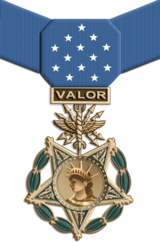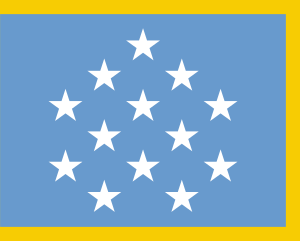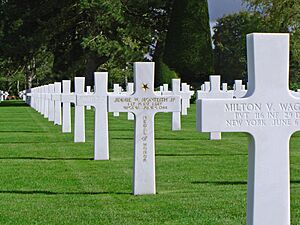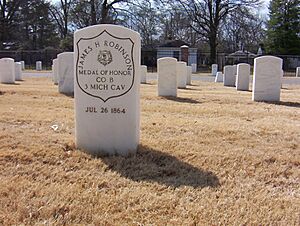Medal of Honor facts for kids
Quick facts for kids Medal of Honor |
|
|---|---|
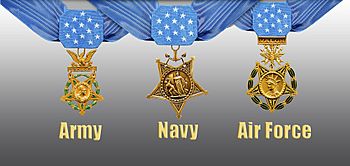
Medals of Honor of the three military departments
|
|
| Presented by | The president of the United States in the name of the United States Congress |
The Medal of Honor (MOH) is the highest military award given by the United States Armed Forces. It is given to American soldiers, sailors, marines, airmen, guardians, and coast guardsmen. This medal recognizes acts of amazing bravery and courage.
The president of the United States, who is the leader of the armed forces, usually presents the medal. It is given "in the name of the United States Congress." People sometimes call it the Congressional Medal of Honor, but its official name is simply "Medal of Honor."
There are three different types of the medal. One is for the Army, one for the Navy (which includes sailors, marines, and coast guardsmen), and one for the Air Force (for airmen and guardians). The Navy's Medal of Honor started in 1861, and the Army's in 1862. The Air Force used the Army's medal until they got their own in 1965. The Medal of Honor is the oldest military award given continuously in the U.S. Armed Forces.
The president typically gives the Medal of Honor in a special ceremony. This ceremony shows the American people's thanks. If someone receives the medal after they have passed away, it is given to their closest family member. As of September 2023, 3,536 Medals of Honor have been awarded. More than 40% of these were for actions during the American Civil War. March 25 is known as Medal of Honor Day.
Contents
History of the Medal of Honor
In 1861, at the start of the American Civil War, someone suggested creating an award for bravery on the battlefield. Lieutenant General Winfield Scott, who was in charge of the Army, did not like the idea. He thought giving medals for bravery was an old European tradition, not something for a republic like the U.S.
However, after Scott retired, Secretary of the Navy Gideon Welles decided to create an award for naval service. On December 9, 1861, Senator James W. Grimes from Iowa introduced a bill. This bill allowed for 200 "medals of honor" for sailors and marines who showed great bravery. President Abraham Lincoln signed this bill into law on December 21, 1861. The Philadelphia Mint was asked to design the new medal.
For the Army, Senator Henry Wilson introduced a similar idea on February 15, 1862. This resolution was approved by Congress and signed into law on July 12, 1862. It allowed medals for non-commissioned officers and privates who showed great bravery during the war. The Army's medal had "The Congress to" written on the back. Both early versions were made of copper coated with bronze, giving them a reddish color.
On March 3, 1863, Congress made the Army Medal of Honor a permanent award. It could now be given to officers as well. On March 25, the first Medals of Honor were given to six U.S. Army volunteers.
Over the years, the medal's design changed a few times. In 1904, the Army's medal was redesigned to look different from other medals.
In 1917, a review board looked at all Army Medals of Honor. They decided that 911 medals had been given out incorrectly. These were taken off the official list. Among them were William Frederick "Buffalo Bill" Cody and Mary Edwards Walker. Later, in 1977, Mary Edwards Walker's medal was given back to her family. In 1989, Buffalo Bill's medal and those of four other civilian scouts were also given back.
A separate Medal of Honor for the Coast Guard was approved in 1963, but it was never designed or awarded. The Air Force got its own medal design in 1965, and the first one was given in 1967. Before that, Air Force members received the Army's version.
Appearance of the Medal
There are three main designs for the Medal of Honor. Each one is for a different part of the military: the Army, the Navy (which includes the Marine Corps and Coast Guard), and the Air Force (which includes the Space Force). Even though the Coast Guard is part of the Department of Homeland Security, its members receive the Navy version of the medal.
Each medal is made differently, using metals like gilding metal and red brass, with some gold plating and enamel.
Army Medal Design
The Army's medal is a gold five-pointed star. It has green laurel leaves around it and hangs from a gold bar that says VALOR. An eagle sits on top of the bar. In the middle of the star is the head of Minerva, a Roman goddess, surrounded by the words UNITED STATES OF AMERICA. The back of the medal says THE CONGRESS TO with a space for the recipient's name.
The Navy's medal is a five-pointed bronze star. It has laurel and oak leaves. In the center is Minerva, representing the United States. She holds a shield and pushes away snakes, which stand for conflict. The medal hangs from an anchor.
Air and Space Forces Medal Design
The Air and Space Forces medal is a gold five-pointed star within a wreath of green laurel. In the center, there's a circle of 34 stars with a picture of the Statue of Liberty's head. The star hangs from a bar that says VALOR above a design like Jupiter's thunderbolt, which is on the Air Force's official seal.
Older Medal Designs
The Medal of Honor has changed its look over time. The Navy's star design from 1862 has stayed mostly the same. The Army's 1862 version was similar but used an eagle on cannons instead of an anchor. Both early medals showed a female figure representing the Union.
In 1904, the Army's medal was redesigned with a smaller star and a new light blue ribbon with white stars, which is still seen today. The Navy adopted this ribbon pattern in 1913.
After World War I, the Navy tried to have two versions of the medal: one for combat and one for non-combat. The combat version was a cross shape, designed by the Tiffany Company. This "Tiffany Cross" was not very popular and was stopped in 1942. The Navy went back to using only the original star design.
In 1944, the ribbons for both medals were changed to the neck ribbon we see today. When the Air Force's medal was designed in 1965, it used ideas from the Army version. However, the Air Force wanted to be different, so their medal shows the Statue of Liberty instead of Minerva and uses Jupiter's thunderbolt.
Ribbons and Lapel Button
Since 1944, the Medal of Honor has been worn on a light blue silk neck ribbon. This ribbon has thirteen white stars arranged in three chevron shapes.
When not wearing a full military uniform, recipients can wear a smaller service ribbon. This ribbon is light blue with five white stars in an "M" shape. There is also a small light blue lapel button with thirteen white stars. This button can be worn on civilian clothes.
The Medal of Honor is one of only two U.S. military awards worn around the neck. The other is the Commander's Degree of the Legion of Merit, usually given to people in foreign governments.
Medal of Honor Flag
In 2002, a law was passed to create a special Medal of Honor Flag. This flag is given to every person who receives the Medal of Honor. If the medal is given after someone has passed away, the flag is given to their closest family member.
The flag is light blue with 13 white five-pointed stars. These stars are arranged in a three-bar chevron pattern, similar to the medal's neck ribbon. The flag does not have the words "Medal of Honor" written on it.
The first Medal of Honor Flag was given to the family of U.S. Army Sergeant First Class Paul R. Smith in 2005. He received the Medal of Honor after he passed away.
How Medals are Given

There are two main ways someone can be recommended for the Medal of Honor. The most common way is through their military chain of command. The recommendation must be made within three years and approved within five years.
Another way is when a member of Congress suggests someone for the medal. This usually happens when a citizen asks them to. In both cases, if the recommendation is outside the normal time limits, Congress must pass a special law to allow it.
The President presents the Medal of Honor on behalf of Congress. Since 1980, most recipients, or their families if the award is posthumous, have received the medal directly from the President. Since 1941, more than half of the Medals of Honor have been given after the person passed away.
Rules for Receiving the Medal
The rules for who can receive the Medal of Honor have changed over time.
- Early Days (1800s): At first, the Navy's medal was for "signal acts of valor" in battle. It could also be given for "extraordinary heroism" outside of combat. The Army's medal was for "gallantry in action." Because it was the only military award during the Civil War, some medals were given for actions that might seem less extraordinary today. For example, some were given for saving the U.S. flag, which was very important for communication in battle back then.
- Early 1900s: The Navy gave many Medals of Honor for bravery during peacetime. For example, in 1901, John Henry Helms saved a ship's cook from drowning and received the medal. In 1918, the Army's rules became stricter. The act of bravery had to be "above and beyond the call of duty" and happen "in action involving actual conflict with an enemy."
- World War II: The Navy continued to award some non-combat medals until 1945. After World War II, about 60% of Medals of Honor were given after the person passed away.
- Since 1963: In 1963, the rules for the Medal of Honor became the same for all military branches. To receive the medal, a person must have shown "gallantry and intrepidity at the risk of his life above and beyond the call of duty." This act of bravery must happen in one of three situations:
* Fighting against an enemy of the United States. * During military operations involving conflict with an opposing foreign force. * Serving with friendly foreign forces fighting an armed conflict where the U.S. is not directly involved.
These rules were put in place because the U.S. has not formally declared war since World War II. This allowed the medal to be given for bravery in conflicts like the Korean War and Vietnam War.
Taking Back Medals

Sometimes, a Medal of Honor can be taken back, or "revoked." In the 1800s, the Navy could take back medals for dishonorable behavior. The Army did not do this until the 1900s.
In 1916, a board reviewed all Army Medals of Honor. They found that 911 medals had been given for reasons other than distinguished conduct in combat. These included medals given to members of the 27th Maine Volunteer Infantry Regiment who stayed longer to guard the capital during the Civil War. Also, some civilians, like Mary Edwards Walker and Buffalo Bill Cody, had their medals revoked. Later, some of these medals, including Walker's and Cody's, were given back.
Today, medals can be revoked if new information shows that the person should not have received the award. This usually happens if their actions were not compatible with military service or if they were convicted of serious crimes.
In 2019, a bill called "Remove the Stain Act" tried to revoke Medals of Honor given for actions during the Wounded Knee Massacre of 1890. This bill did not pass. In July 2024, the Department of Defense and Department of Interior began a review to consider revoking these medals. In October 2024, the review concluded, recommending that no medals be revoked.
Special Rights and Honors
Receiving the Medal of Honor comes with special rights and honors:
- Recipients can have their name added to the Medal of Honor Roll.
- They receive a monthly pension, which is extra money beyond any other military benefits. As of December 2023, this was $1,671.16 a month.
- They get special allowances for uniforms and air travel.
- Recipients and their families get special ID cards for shopping at military stores.
- They can be buried at Arlington National Cemetery.
- Their children can be nominated to any of the U.S. service academies.
- They receive a 10% increase in their retired pay.
- Those awarded the medal after October 23, 2002, also receive a Medal of Honor Flag.
- They are invited to all future presidential inaugurations and inaugural balls.
- Recipients can wear their military uniform whenever they wish, with some limits. Other former military members can only wear their uniform on certain special occasions.
- Many states offer special license plates for Medal of Honor recipients.
Saluting Medal of Honor Recipients
Even though it's not always required by law, members of the military are encouraged to salute Medal of Honor recipients. This is a sign of respect, no matter what rank the recipient holds. This is one of the few times a higher-ranking military member will salute someone of a lower rank.
Protecting the Medal
It is against the law to falsely claim you have been awarded the Medal of Honor or other military medals.
- In 1904, the Army patented the new design of its Medal of Honor to prevent copies from being made.
- In 1923, a law was passed making it illegal to wear, make, or sell military medals without permission.
- In 2006, the Stolen Valor Act of 2005 made it a crime to falsely say you received a military decoration. There was a higher penalty for falsely claiming the Medal of Honor.
- In 2012, the Supreme Court said that simply *saying* you had a medal was protected by free speech.
- In 2013, a new version of the law was signed. It made it a federal crime to falsely claim military awards, including the Medal of Honor, if you do it to get "money, property, or other tangible benefit." This means it's illegal if you lie about having the medal to get things like grants, housing, or educational benefits.
Who Has Received the Medal?
- The first Medals of Honor were given to six U.S. Army soldiers on March 25, 1863. These soldiers were part of the "Andrews Raiders" during the Civil War. Private Jacob Parrott was the first to actually receive the medal.
- Bernard John Dowling Irwin was the first person to earn the Medal of Honor for actions that happened earliest in time (February 13, 1861).
- The first U.S. Navy sailors received the medal on April 3, 1863.
- The first marines to get the medal were John F. Mackie and Pinkerton R. Vaughn on July 10, 1863.
- The only Coast Guardsman to receive the Medal of Honor was Signalman First Class Douglas Munro. He received it after he passed away in 1943 for saving 500 marines under fire during the Battle of Guadalcanal.
- The only woman to receive the Medal of Honor is Mary Edwards Walker. She was a civilian Army assistant surgeon during the Civil War. Her medal was taken away in 1917 but given back in 1977.
- The first black recipients of the Medal of Honor were soldiers and sailors who fought in the Civil War. Robert Blake was the first black recipient, receiving it in 1864.
-
The only Medal of Honor kept "top secret" was given to Hiroshi "Hershey" Miyamura for his actions in the Korean War. It was kept secret to protect him while he was a prisoner of war.
 President Dwight D. Eisenhower congratulates SSG Miyamura after having awarded him the Medal of Honor on October 27, 1953.
President Dwight D. Eisenhower congratulates SSG Miyamura after having awarded him the Medal of Honor on October 27, 1953.
Sixty-one Canadians who served in the U.S. Armed Forces have earned the Medal of Honor. Most of them were during the American Civil War.
Sometimes, exceptions have been made to the rules for who can receive the medal:
- Charles Lindbergh, a civilian pilot, received the medal in 1927 for his famous flight across the Atlantic. This was allowed by a special act of Congress.
- Major General (Retired) Adolphus Greely received the medal in 1935 for his "life of splendid public service," not for a specific act of bravery in combat.
- Medals have also been given to "Unknown Soldiers" from different wars, representing all those who died and could not be identified.
| Army | Navy | Marine Corps | Air Force | Coast Guard | Total |
|---|---|---|---|---|---|
| 2,461 | 749 | 300 | 19 | 1 | 3,530 |
Double Recipients
Nineteen service members have received the Medal of Honor twice. The first person to receive two Medals of Honor was Thomas Custer (brother of George Armstrong Custer) for two different actions during the Civil War.
Five people received both the Army and Navy Medals of Honor for the *same* action during World War I. This happened because marines were serving under Army command at the time. Today, a person cannot receive more than one medal for the same action. If someone earns another award that would qualify for the Medal of Honor, they receive a special device or ribbon instead of a second medal.
The most Medals of Honor earned by any service member is two. The last person alive to receive two Medals of Honor was John J. Kelly in 1918. The last person to receive two Medals of Honor for two different actions was Smedley Butler in 1914 and 1915.
| Name | Service | Rank | War(s) | Notes |
|---|---|---|---|---|
| Frank Baldwin | Army | First Lieutenant, Captain | American Civil War, Indian Wars | |
| Smedley Butler | Marine Corps | Major | Veracruz, Haiti | |
| John Cooper | Navy | Coxswain | American Civil War | |
| Louis Cukela | Marine Corps | Sergeant | World War I | Awarded both Navy and Army versions for same action. |
| Thomas Custer | Army | Second Lieutenant | American Civil War | Battle of Namozine Church on April 3 and Battle of Sayler's Creek on April 6, 1865. |
| Daniel Daly | Marine Corps | Private, Gunnery Sergeant | Boxer Rebellion, Haiti | |
| Henry Hogan | Army | First Sergeant | Indian Wars | |
| Ernest A. Janson | Marine Corps | Gunnery Sergeant | World War I | Both awarded for same action. Received the Army MOH under the name Charles F. Hoffman. |
| John J. Kelly | Marine Corps | Private | World War I | Both awarded for same action. |
| John King | Navy | Water tender | Peacetime | 1901 and 1909 |
| Matej Kocak | Marine Corps | Sergeant | World War I | Both awarded for same action. |
| John Lafferty | Navy | Fireman, First Class Fireman | American Civil War, peacetime | |
| John C. McCloy | Navy | Coxswain, Chief Boatswain | Boxer Rebellion, Veracruz | |
| Patrick Mullen | Navy | Boatswain's Mate | American Civil War | |
| John H. Pruitt | Marine Corps | Corporal | World War I | Both awarded for same action. |
| Robert Sweeney | Navy | Ordinary Seaman | Peacetime | 1881 and 1883 |
| Albert Weisbogel | Navy | Captain of the Mizzen Top | Peacetime | 1874 and 1876 |
| Louis Williams | Navy | Captain of the Hold | Peacetime | 1883 and 1884. Also known as Ludwig Andreas Olsen. |
| William Wilson | Army | Sergeant | Indian Wars |
Family Members Who Received the Medal
Arthur MacArthur, Jr. and Douglas MacArthur were the first father and son to both receive the Medal of Honor. The only other father-son pair is Theodore Roosevelt (awarded in 2001) and Theodore Roosevelt, Jr..
Seven pairs of brothers have received the Medal of Honor, often for actions in different battles or wars. For example, John and William Black were the first brothers to be honored this way during the Civil War.
There are also two pairs of uncle and nephew recipients. Admiral Frank Friday Fletcher and his nephew, Admiral Frank Jack Fletcher, both received the medal for actions during the United States occupation of Veracruz. Guy W. S. Castle and his nephew Frederick Walker Castle also received the medal for different conflicts.
Awards Given Later
Since 1979, 86 Medals of Honor have been awarded for actions that happened many years earlier, from the Civil War to the Vietnam War. Also, five recipients whose medals were taken away in 1917 had them restored.
In 1993, a study looked into whether there was "racial disparity" in awarding medals. At that time, no Medals of Honor had been given to black U.S. soldiers from World War II. After a detailed review, ten soldiers who had received the Distinguished Service Cross were recommended for the Medal of Honor. In 1997, President Bill Clinton presented the Medal of Honor to seven of these veterans, six of them after they had passed away.
In 1998, a similar study for Asian Americans led to President Clinton presenting 22 Medals of Honor in 2000. Many of these went to soldiers of Japanese descent who served in World War II. One of them was Senator Daniel Inouye.
In 2005, President George W. Bush presented the Medal of Honor to Tibor Rubin, a Hungarian-born American Jew and Holocaust survivor. Many believed he had been overlooked because of his religion.
On April 11, 2013, President Obama presented the Medal of Honor to Army chaplain Captain Emil Kapaun after he passed away. He was honored for his actions as a prisoner of war during the Korean War.
In 2014, President Obama upgraded Distinguished Service Crosses to Medals of Honor for 24 Hispanic, Jewish, and black individuals. This was done to correct past oversights due to prejudice.
Other Similar U.S. Awards
There are other awards in the U.S. that have similar names to the Medal of Honor but are completely separate:
- Cardenas Medal of Honor: An old award from the U.S. Revenue Cutter Service.
- Congressional Space Medal of Honor: The highest medal given by NASA. Military astronauts can also receive the military's Medal of Honor, but so far, none have received both.
See also
 In Spanish: Medalla de Honor para niños
In Spanish: Medalla de Honor para niños
- Medal of Honor Day
- List of Medal of Honor recipients
- National Medal of Honor Museum
 | Laphonza Butler |
 | Daisy Bates |
 | Elizabeth Piper Ensley |


